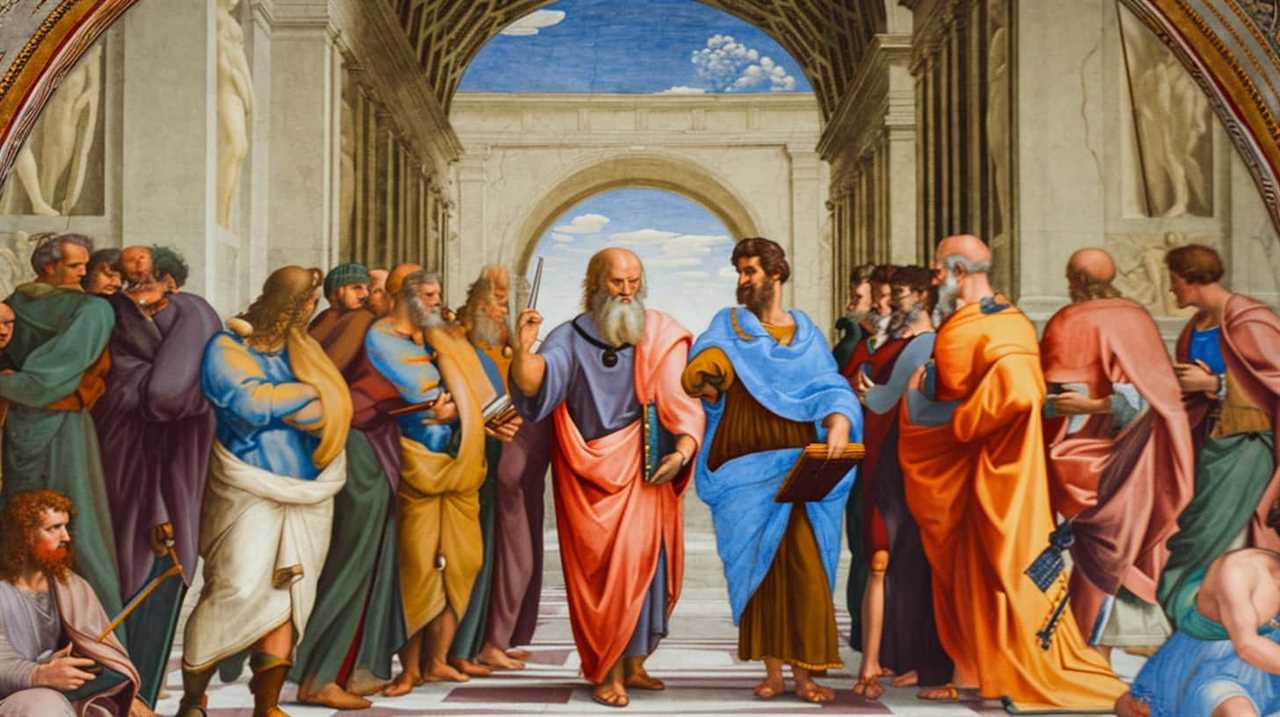Have you ever gazed into a kaleidoscope and been amazed by how a slight turn can turn a chaotic mix of colors into a captivating design? Similarly, the realm of metaphysics presents us with a kaleidoscope of deep understandings about the essence of ultimate reality.
In this article, we present to you five timeless metaphysical quotes that will challenge your perception of existence and ignite your thirst for innovation.
From Plato’s profound contemplation on the essence of being to Buddha’s wisdom on the ultimate truth, these quotes will take you on a journey of introspection and expansion.
So, fasten your seatbelts and get ready to explore the depths of reality like never before. Let’s dive in!
Key Takeaways
- Plato and Nietzsche challenge conventional notions of reality, encouraging a deeper understanding of existence.
- Descartes and Kant invite questioning of the nature of consciousness and its role in shaping our understanding of the world.
- Kant’s theory of transcendental idealism highlights the role of perception and understanding in shaping our experience of reality.
- Various perspectives, such as pantheism, solipsism, and collective consciousness, offer alternative understandings of ultimate reality.

Plato’s Insight on Existence
In our exploration of ultimate reality, we delve into Plato’s profound insight on the nature of existence. Plato, the ancient Greek philosopher, introduced the theory of forms, which suggests that the physical world we perceive is merely a shadow of the true reality. According to Plato, there exists a realm of perfect and timeless forms, and the physical objects we encounter in our daily lives are imperfect copies of these ideal forms.
Plato’s allegory of the cave beautifully illustrates this concept. In the allegory, prisoners are chained inside a dark cave, facing a wall where shadows of objects are projected. These prisoners mistake these shadows for reality, unaware of the true forms outside the cave. Only when one prisoner is freed and exposed to the outside world does he realize the illusory nature of the shadows.
Plato’s theory of forms challenges us to question the nature of our reality. Are we, like the prisoners, confined to a limited perception of the world? Are the physical objects we encounter merely imperfect copies of an ideal form? This insight encourages us to seek a deeper understanding of existence and to strive for innovation in our pursuit of knowledge.

Nietzsche’s Perspective on the Illusion of Reality
While exploring the illusion of reality, we come to understand Nietzsche’s perspective on the subject. Nietzsche’s critique of the illusion of reality challenges our conventional understanding of truth and existence. In his alternative view, Nietzsche suggests that our perception of reality isn’t an objective reflection of the world, but rather a subjective interpretation shaped by our individual perspectives.
To grasp Nietzsche’s perspective on the illusion of reality, we must consider the following:
- The Will to Power: Nietzsche argues that our perception of reality is influenced by our desire for power and dominance. Our interpretation of the world is shaped by our innate drive to assert our will and impose our values onto others.
- The Death of God: Nietzsche’s critique also stems from his belief that the concept of God has shaped our understanding of reality. With the decline of traditional religious beliefs, Nietzsche suggests that we must confront the illusion of reality and find new ways to make sense of the world.
- The Overman: Nietzsche proposes the idea of the Overman, a being who transcends the limitations of conventional reality and embraces the power of perspective. The Overman recognizes the illusion of reality and strives to create new interpretations and possibilities.
- The Eternal Recurrence: Nietzsche presents the concept of the Eternal Recurrence, suggesting that reality is an infinite cycle of repetition. Through this idea, Nietzsche challenges us to question the stability and permanence of our perceived reality.
As we delve into Descartes’ reflections on the nature of being, we’ll explore another perspective that sheds light on the complexity of reality and existence.

Descartes’ Reflections on the Nature of Being
Descartes’ reflections on the nature of being shed further light on our understanding of reality and existence. His philosophy of dualism, which posits the separation of mind and body, challenges conventional notions of what it means to be. Descartes’ cogito ergo sum, or ‘I think, therefore I am,’ serves as a foundational principle in his exploration of existence.
Descartes’ dualism introduces the idea that the mind and body are distinct entities, each with its own unique properties. This duality opens up a realm of possibilities in our understanding of reality, suggesting that there may be more to existence than what meets the eye. It invites us to question the nature of our own being and the relationship between our thoughts and our physical experiences.
Descartes’ cogito ergo sum further deepens our exploration of reality by affirming the existence of the self through the act of thinking. It urges us to contemplate the essence of our own consciousness and its role in shaping our understanding of the world around us.

Kant’s Theory of Transcendental Idealism
Let’s explore Kant’s theory of transcendental idealism, which offers a unique perspective on the nature of reality and the limits of our knowledge. Kant’s epistemological approach, as outlined in his renowned work ‘Critique of Pure Reason,’ challenges our understanding of reality by distinguishing between noumena and phenomena.
- Noumena vs Phenomena: Kant posits that there are two realms of existence: the noumenal realm, which represents things as they truly are, independent of our perception, and the phenomenal realm, which encompasses the world as it appears to us. According to Kant, we can only have knowledge of phenomena, as our senses and mental faculties shape our understanding of reality.
- Transcendental Idealism: Kant argues that our perception of reality is shaped by our understanding and conceptual framework. He suggests that our minds impose certain structures, such as space and time, onto the raw data of our senses. This means that our experience of reality isn’t an accurate representation of the noumenal realm, but rather a construction of our own minds.
- Limits of Knowledge: Kant asserts that our knowledge is limited to the phenomenal realm. We can never know things as they’re in themselves, beyond our subjective experience. Our understanding is constrained by the inherent limitations of our cognitive faculties.
- Subjectivity and Objectivity: Kant’s theory emphasizes the subjective nature of our perceptions, highlighting that our understanding of reality is shaped by our individual perspectives. However, he also acknowledges the existence of objective truths that transcend individual experiences, such as the laws of logic and mathematics.
Kant’s theory of transcendental idealism challenges our conventional understanding of reality by questioning the relationship between our perceptions and the external world. It reminds us that our knowledge is always limited and subjective, urging us to approach the nature of reality with humility and openness to new possibilities. In doing so, it encourages us to continuously question and innovate our understanding of the world around us.

Buddha’s Wisdom on the Ultimate Truth
As we delve into the exploration of Buddha’s Wisdom on the Ultimate Truth, it becomes apparent that his teachings offer profound insights into the nature of reality and the pursuit of enlightenment.
Buddha’s teachings on enlightenment guide us towards a deeper understanding of the ultimate truth, the fundamental nature of existence, and the path to liberation.
Buddha taught that the ultimate truth lies beyond the realm of conventional reality. It’s a truth that transcends the limitations of our ordinary perception and conceptualization. To attain enlightenment, we must cultivate wisdom and insight, breaking free from the illusions and delusions that cloud our understanding.
The path to liberation, according to Buddha, involves the recognition of the impermanence and unsatisfactoriness inherent in all phenomena. By understanding the transient nature of existence and the futility of clinging to ephemeral pleasures, we can free ourselves from suffering and attain a state of true liberation.
Buddha’s teachings on enlightenment also emphasize the importance of mindfulness and compassion. Through the practice of mindfulness, we can develop a deep awareness of the present moment, transcending the distractions of past and future. And through the cultivation of compassion, we can extend our care and understanding to all sentient beings, fostering a sense of interconnectedness and unity.

Frequently Asked Questions
How Does Plato’s Insight on Existence Relate to the Concept of Time?
Plato’s insight on existence provides a profound understanding of the concept of time. His exploration of the relationship between existence and temporality allows us to contemplate the elusive nature of time and its influence on our understanding of reality.
What Are Some Practical Implications of Nietzsche’s Perspective on the Illusion of Reality?
Nietzsche’s perspective on the illusion of reality offers practical implications that challenge our conventional understanding. It forces us to question our own assumptions and invites us to embrace a more flexible and creative approach to navigating the complexities of existence.
How Does Descartes’ Reflection on the Nature of Being Challenge Our Understanding of Consciousness?
Descartes’ challenge to consciousness forces us to reevaluate our understanding of being. By questioning the nature of our existence, he unveils the depths of our consciousness and invites us to explore the intricacies of our own awareness.
Can You Explain Kant’s Theory of Transcendental Idealism in Relation to the Concept of Ultimate Reality?
Kant’s theory of transcendental idealism provides a profound perspective on ultimate reality. It challenges traditional notions of existence by highlighting the role of perception and the limitations of our understanding.
How Does Buddha’s Wisdom on the Ultimate Truth Influence Our Understanding of the Physical World?
Buddha’s teachings on ultimate truth shape our understanding of the physical world by revealing the impermanence and interconnectedness of all things. Plato’s insight on existence and time further impacts our perception, inspiring innovative thinking.

How Do Modern Takes on Epistemological Theory Compare to Timeless Metaphysical Quotes on Ultimate Reality?
Modern epistemological theories, such as coherentism and reliabilism, offer a fresh perspective on understanding knowledge and truth. While timeless metaphysical quotes on ultimate reality provide insights, the best modern epistemological theories challenge traditional paradigms and offer innovative approaches to understanding the nature of knowledge and reality.
Conclusion
In the realm of metaphysics, we delve into the depths of existence, reality, and truth. Through the timeless insights of Plato, Nietzsche, Descartes, Kant, and Buddha, we’re reminded of the profound nature of ultimate reality.
Like a delicate spiderweb connecting all aspects of life, these metaphysical truths weave together to form a tapestry of enlightenment.
As we ponder these profound ideas, we’re invited to question, explore, and embrace the mysteries that lie beyond our everyday perceptions.









